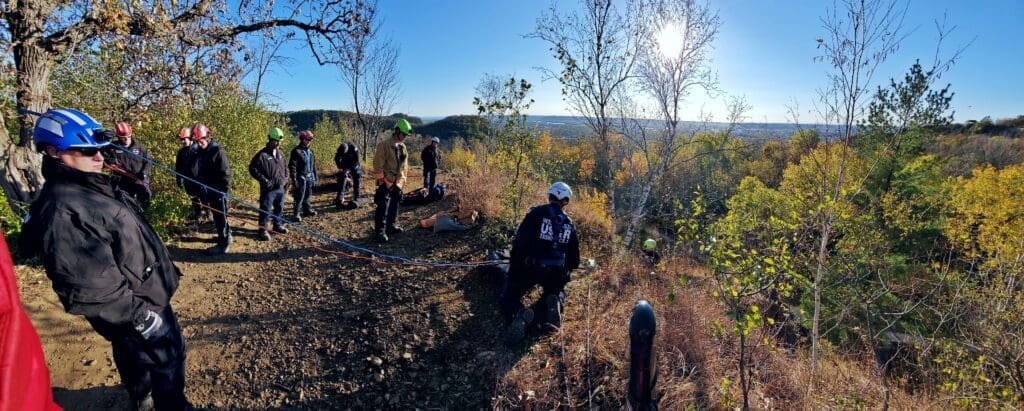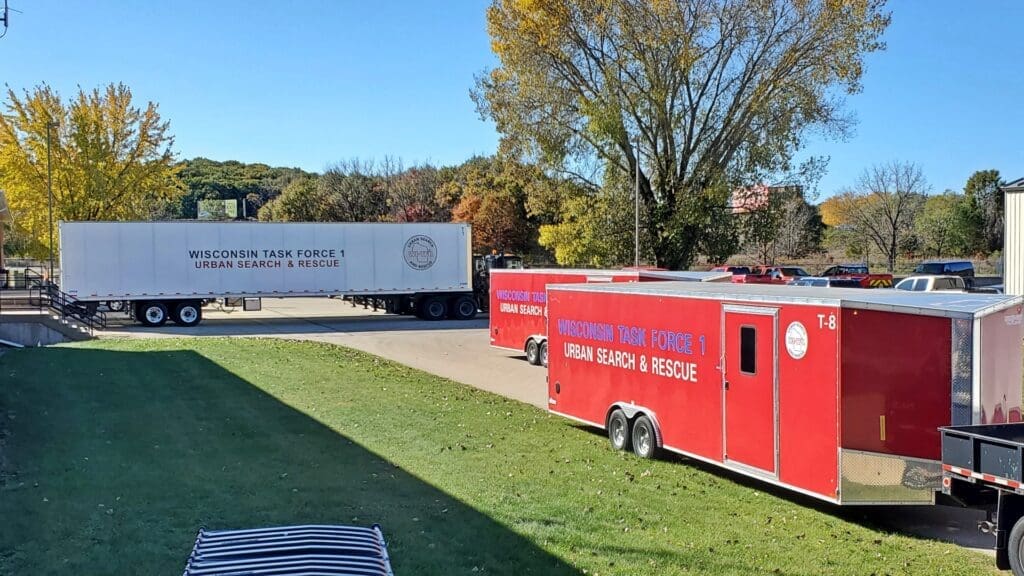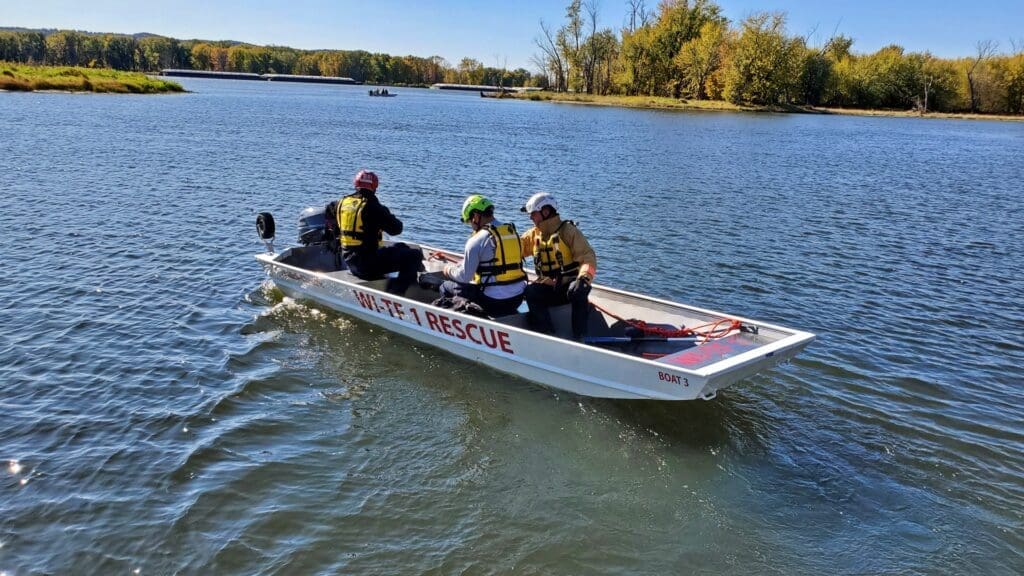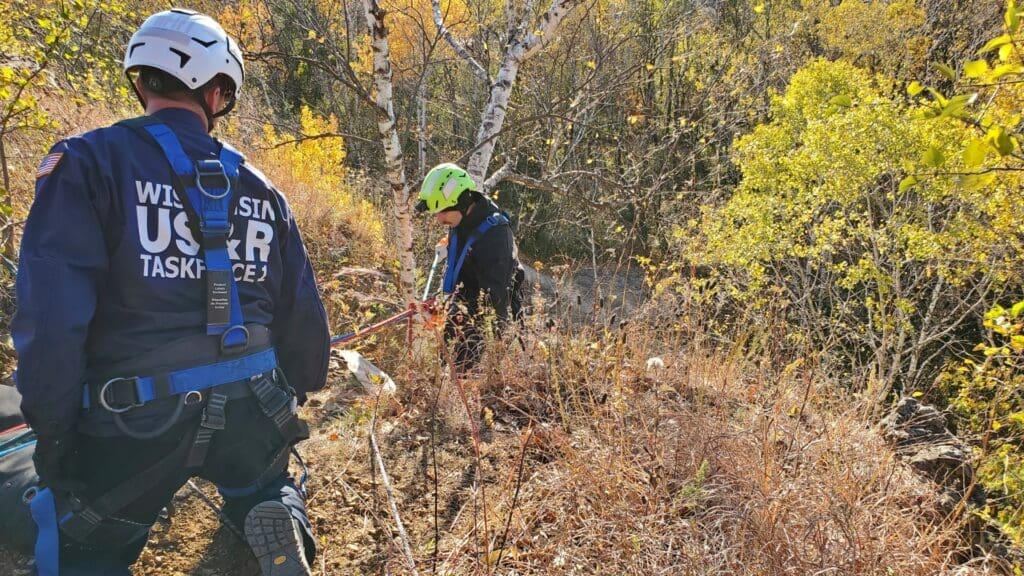
CAMP DOUGLAS, Wis. — On a chilly October morning, dozens of phones buzzed across the state, with the notification instructing recipients to report to the Regional Emergency All-Climate Training (REACT) Center at Volk Field in Camp Douglas. The notification marked the start of the first major exercise for the newly re-formed Wisconsin Urban Search and Rescue Task Force, known as Wisconsin Task Force 1, and the excitement was brewing.
“This is great, it’s my first operational readiness exercise with this team,” said Deputy Fitchburg Fire Chief Robert Kunze, who had been looking forward to this day after joining the task force in July. “This is a great learning experience for myself, allowing me to get comfortable in my position as the planning manager of Wisconsin Task Force 1, and working with the various teams in different roles.”
The task force, managed by Wisconsin Emergency Management, is a team of highly skilled people from communities across Wisconsin that can respond to both state and national disasters.
The October exercise was the first time the entire urban search and rescue team has worked together in this capacity since it was suspended in 2018 due to contractual issues. The Wisconsin Legislature resolved those issues earlier this year, and the task force resumed operations in August with more than 90 members returning to the team. The task force also includes some newer recruits, like Kunze.

“Right now, people at home are seeing search and rescue teams in action after hurricanes, but there is a resource like that right here in Wisconsin,” said Kunze. “Task Force 1 can assist smaller departments in large-scale incidents when they are getting low on resources and request help from the state.”
October’s exercise simulates a real activation. Members of Wisconsin Task Force 1 were notified while at their homes or primary place of employment they needed to respond to the REACT Center, which is where the team’s equipment is stored. Upon arrival, members checked in, underwent a simulated medical check, reviewed items needed for their gear bags and received a briefing before deploying to La Crosse.
“We are dusting off the cobwebs with this exercise and it’s great,” said Doug Vrechek, one of the task force leaders. “Typically, this would be a 72-hour readiness exercise, but this year we are doing a two-day exercise to test our processes and get reacquainted with the equipment Wisconsin Task Force 1 has available.”
This year, two smaller teams were sent to La Crosse to test their skills. Both teams got a chance to brave the cold waters of the Mississippi River and rappel down Grandad Bluff.

Along the banks of the Mississippi River, two red trailers were unloaded with both solid and inflatable boats. A small group of task force members put on their dry suits, helmets, and personal flotation devices, then grabbed handheld GPS units. They boarded their boats in teams of three and began the task of locating targets while out on the water using their GPS units.
“This is a skill everyone on the team will learn,” said Wade Flisram, a La Crosse firefighter and REACT instructor. “The more people who can do things, the better off you are. What’s great is all these different firefighters at departments from Superior to Janesville are bringing their expertise and sharing how they execute those skills in their community. With Wisconsin Task Force 1, we get to take that conglomeration to get the best of the best to make the state safer.”
While one team was out on the water, another team took to higher ground to hone their rope rescue skills. While going over the equipment, some firefighters shared their knowledge with other members and taught them skills they have gained over their careers. They worked together to set up a main line and belay system, and then each team member rappelled down the bluff.
Wisconsin Task Force 1 Rescue Specialist Cory Westpfahl said the props at the state’s REACT Center are great for training but coming to La Crosse provides more realistic experiences and gives legitimacy to their training.
“We train so we are ready for the next major disaster, like an insurance policy,” said Westpfahl. “You don’t want to call us, but if you do you want to make sure the policy works, and that policy is us.”
Near the end of the first day of the exercise, Westpfahl said everything from the initial call to packing up their equipment to return to the REACT Center went well. The La Crosse firefighter said the band is back together and they will continue to review and refine their skills.
“Today was a fun and challenging day, and we love it,” said Westpfahl. “Some of the times we only see these people through the task force, so it’s nice seeing some familiar faces again.”
“From a preparedness perspective, it is comforting to know that Wisconsin Task Force 1 is ready to meet the challenge, should the need arise,” said Paul Cooke, Wisconsin Emergency Management Response and Recovery Bureau Director.


